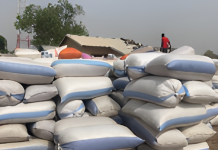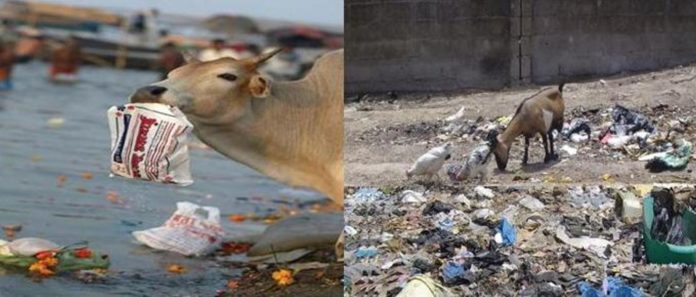By Sheikh Alkinky Sanyang
Dawda Badgie, the Director of Technical Services Network at the National Environment Agency (NEA), has disclosed that plastic bag pollution renders severe environmental and health threat to humans, livestock and the Marine Eco-system; that due to its adverse effects and uncompromising hazards, the Government of the Gambia has on 1st July 2015, banned the use, production and sale of plastics bags in the country.
Badgie made this statement recently during a press briefing held at the home of the NEA on Jimpex road, Kanifing. He told the gathering that the country needs the blessing, support and collaboration of all and sundry, in an effort to collectively effect the ban on plastic bags found in our sustainable livelihood support systems.
He disclosed that Plastic bags do not decompose for many years and therefore have the potential to destroy soil nutrients and structure and affect tree-roots penetration thereby threatening productivity; that our livestock are also killed alongside other smaller domestic animals when they ingest or swallow plastic, resulting to huge economic losses to farmers.
He added, “Due to improper disposal systems, many domestic and stray animals end up consuming plastic and get entangle and suffocate to death. Thousands of animals worldwide including cows, goats, sheep, dolphins, turtles, whales and penguins, are killed every year due to plastic ingestion. Many animals ingest plastic, mistaking them for food and die. The worst part is that the ingested plastic bag remains intact even after the death and decomposition of the animal. Thus, it lies around in the landscape where another victim may ingest it.
The continuous use of plastic threatens our food security as they resist decomposition for decades and becomes a virtual eye-sore in public places. Most plastic wastes find its way into gutters and water ways and causes blockage during the rainy season, subsequently leading to flooding of cities and growth centers”.
Counting on the threats of plastic, Director Badgie disclosed that when plastic is burnt, it emits dangerous chemicals such as dioxins and furans; that these are Persistent Organic Pollutants, that are casinogenic and can cause cancer and other life-threatening diseases. Furthermore, he said Plastic is often misused by putting hot or cold food in bags underlining that the use of plastic bags to package hot or cold food in it is very dangerous; that it releases a chemical residue content of the plastic into the food which can lead to long-term health problems.
He revealed that the Environmental Education and Communication team of the agency will embark on a nationwide sensitization tour to community radio stations. These local radio FM stations will include Paradise FM in Farafenni, GRTS radio in Basse, Brikamabaa Community radio, Soma FM and Kaira FM in Kuloro. These phone-in radio programs will generate lots of listenership who can also contribute through phone calls.
“The ban on plastic bags is a right move in the right direction as it reflects on the dangers to both human and the environment. Plastic bags are non-biodegradables and can cause serious threat to the fragile eco-system of the country and the environment in general”. Dr. Badgie warned.
This dire situation, he pointed out warranted the Government of the Gambia to completely ban the importation of plastics into the country with effect from 1st July 2015 and equally announced a zero tolerance on environmental cleanliness to avert the numerous problems related to environmental mismanagement.
Speaking earlier, Barrister Lamin Samateh thanked the Government of the Gambia and the NEA for their foresight and commitment in averting serious environmental hazards by banning the usage, sale, and consumption of plastic bags. He therefore called on all and sundry not to smuggle this ban substance through our borders into the country.





















